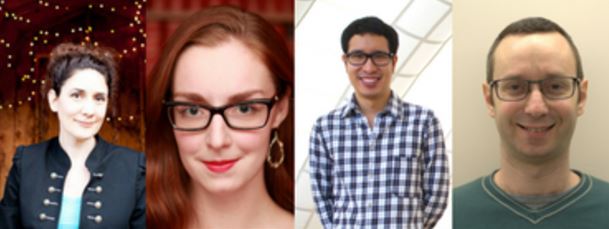
The Department of Philosophy celebrates recipients of the Vanier Canada Graduate Scholarship for their research in philosophy. Recipients of the Vanier scholarship receive $50,000 annually, for up to three years, to support their doctoral research, and are selected based on their leadership skills and high standards of scholarly achievement in the social sciences and humanities, natural sciences and engineering, or health-related fields.
Current Vanier scholars from the department include Valerie Bernard, Prach Panchakunathorn, Celia Byrne and Etye Steinberg. Learn more about these stellar graduate students’ areas of research:
Valerie Bernard (2016)
My area of research is in the phenomenological discussion of identity and self-knowledge. With particular interest in the philosophy of Jean-Paul Sartre, Merleau-Ponty, and others in the French tradition, I will be looking at the ways in which we understand the self in relation to others and the world, and specifically how we understand ourselves in this relation. I am grateful for Vanier’s generous support that allows me to focus on my studies in this area.
Prach Panchakunathorn (2016)
My proposed research topic is in the overlapping area between ethics, philosophy of language, and philosophy of mind. More specifically, it concerns how moral statements, as well as mental states associated with them, can have logical relations with each other if they cannot be true or false. The Vanier Scholarship also helps reduce my teaching workload, and thus allows me to focus more time and energy on my research.
Celia Byrne (2015)
My research focuses on Ibn Sina’s modal metaphysics and how his understanding of necessity and possibility allow him to hold some very un-Aristotelian positions. I am most interested in how he severs the Aristotelian link between necessity and eternity.
Having a Vanier scholarship has helped me with my research tremendously. Almost all the primary sources that I use for my research are in Arabic and some have never been translated into English. Therefore, I have had to master philosophical Arabic and learn how to read texts that many native Arabic speakers find difficult. Having a Vanier scholarship has made this process immeasurably easier. It has afforded me the flexibility in my schedule to spend the last three summers attending intensive and immersion Arabic language programmes, such as the summer language school at Middlebury College. Without the flexibility that the Vanier has given me, there is no way I could have learned this critical and difficult skill.
Etye Steinberg (2014)
In my dissertation, I inquire into the nature and possibility of responsibility for the self. Specifically, I argue that such responsibility consists in answerability for those attitudes which are sensitive to one’s evaluative capacities as an agent, and which are constitutive of one’s self – in the sense that they shape one’s cross-temporal deliberation and reasoning.
These attitudes comprise what one cares about, what matters to oneself. Being answerable for such attitudes, I argue, requires the capacity to ask a question. In particular, it requires the capacity to ask, on one’s own, what matters. This the capacity to reflect on one’s own mental states, as such.
According to these views, responsibility for actions rests on one’s reflectively endorsing one’s relevant motivating attitudes, and responsibility for one’s attitudes rests on reflectively endorsing one’s very self as someone motivated by these attitudes. This seems to lead to an infinite regress problem for these ‘reflectionist’ views.
My view avoids this regress since it regards all kinds of responsibility – for actions, attitudes, and self – as essentially grounded in the same capacity. Thus, I argue that reflection is not necessary for responsibility for the self.
SHARE